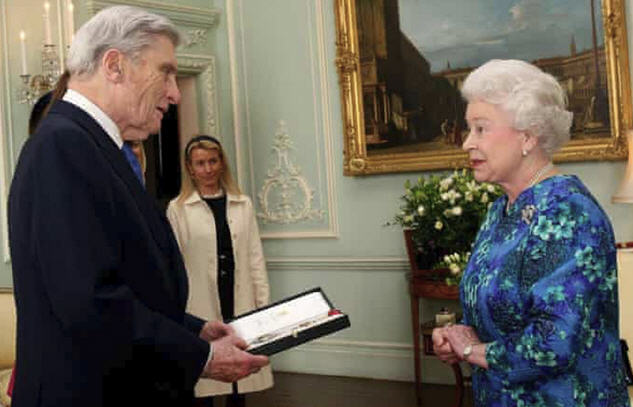John William Warner, 18 February 1927-25 May 2021
Senator, Secretary of the Navy, Gentleman

(Above: John Warner being presented an honorary knighthood by Queen Elizabeth in 2009. Photograph: Rex/Shutterstock)
As you are aware, Socotra House attempts to keep a respectful account of the departure of people who have shared- or shaped- the events of this world. One who affected many of us passed this week. The email chain of those who shared memories of interactions with him is long, and their stories are their own to share. He leaves a legacy that appears universal. He was an approachable man, kind and understanding for those who served. He lived to age 94.
Many will remember the headlines that surrounded his marriage to film star Elizabeth Taylor. He appeared comfortable in the glare of publicity, but that is the way he passed through this world. He had a direct impact on our little band of professionals. Naval Intelligence stalwart Joe Mazzafro put it this way:
“Personally, I saw John Warner regularly when he was SecNav and I was a Lieutenant standing watch in the CNO Intelligence Plot in the Pentagon. A Soviet Amphibious exercise in the Black Sea was briefed during the daily morning intel brief OPNAV seniors. Secretary Warner asked how many Alligator LSTs were in the Soviet Navy total? Because the answer was not readily known by anyone in the briefing theater the question came to the “watch” to research and answer. It was an easy order-of-battle look-up question that allowed me to get the answer back before the briefing concluded. On his way out of the OPNAV Command Center, the Secretary walked into the intel plot watch center saying he wanted to meet the first person in the Pentagon who could answer a question in less than two minutes. It was a small act that obviously meant a lot to me, but is emblematic of his thoughtfulness towards subordinates. Two lasting effects from this brief encounter: I became life-long John Warner Loyalist and it was a lesson in leadership that I have tried to emulate ever since.”
Godfrey Hodgson did an obit in The Guardian (UK) that started out this way:
“Craggy of face and crusty of manner, he was central casting’s very image of a conservative Republican senator – dedicated champion of a big Navy in the Nixon administration and later a leading advocate of strategic missile defense as chair of the powerful Senate armed services committee.”
Continuing an international view, Hodgson goes on to note that he was “a conservative of a traditional kind. Yet he was also an astute judge of political realities and an unusually open-minded senator.” John Warner was a part of the firmament of the state of Virginia I met when it was solid Red, and one of its faces to the world.
He grew up in Washington DC, the son of Martha (nee Budd) and John Warner, a doctor. His family’s roots were across the River in the Old Dominion. A great-uncle of his lost an arm fighting for the Confederacy at the Battle of the Wilderness, just east on the road from Refuge Farm. He attended the fashionable St. Alban’s school, and later Woodrow Wilson high school in the District. At age 17, after Pearl Harbor, he volunteered for service in both the Army and the Navy, but the sailors got him first. After the war, he studied at Washington and Lee on the GI Bill. Today, there is controversy over re-naming the school to meet new times, but when he graduated it reflected its state. When the Korean War broke out on 25 June 1950, he volunteered for the Marines.
Later, he studied law at the University of Virginia and after only two years in private practice, he became an assistant US attorney. In 1957 he married Catherine Mellon, of the Pittsburgh banking, oil and aluminum family. He joined the Nixon administration as undersecretary (1969-72) and then Secretary (1972-74) of the Navy. He was a vigorous supporter for a 600-ship fleet.
In 1973 Warner’s first marriage ended in divorce. Three years later he married Elizabeth Taylor, a box office sensation fresh from a widely publicized divorce from actor Richard Burton. That marriage failed, she later wrote, after his election to the US Senate eclipsed her fame. The Senator had no comment.
He was easily re-elected to the Senate in 1984, 1990 and 2002. In 1999, his tenure paid off by succeeding Strom Thurmond as chair of the SASC. In that capacity, he was instrumental in steering national security money to the Norfolk complex of military bases.
Warner initially backed the Bush Administration’s decision to invade Iraq. He supported that operation until 2003, when he was repelled by allegations of abuse by occupation forces. He eventually called on President Bush to bring US forces home in 2007 and did not seek re-election in 2008.
He returned to private law practice, where he had started his career in the 1960s. In 2009, he was recognized by Queen Elizabeth with the award of an honorary knighthood. He also changed his party affiliation, supporting the candidacies of Hillary Clinton and Joseph Biden.
He is survived by his wife Jeanne Vander Myde, who he married in 2003, three children from his first marriage and two grandchildren.
John Warner was a gentleman, and his service to the nation will be remembered.
